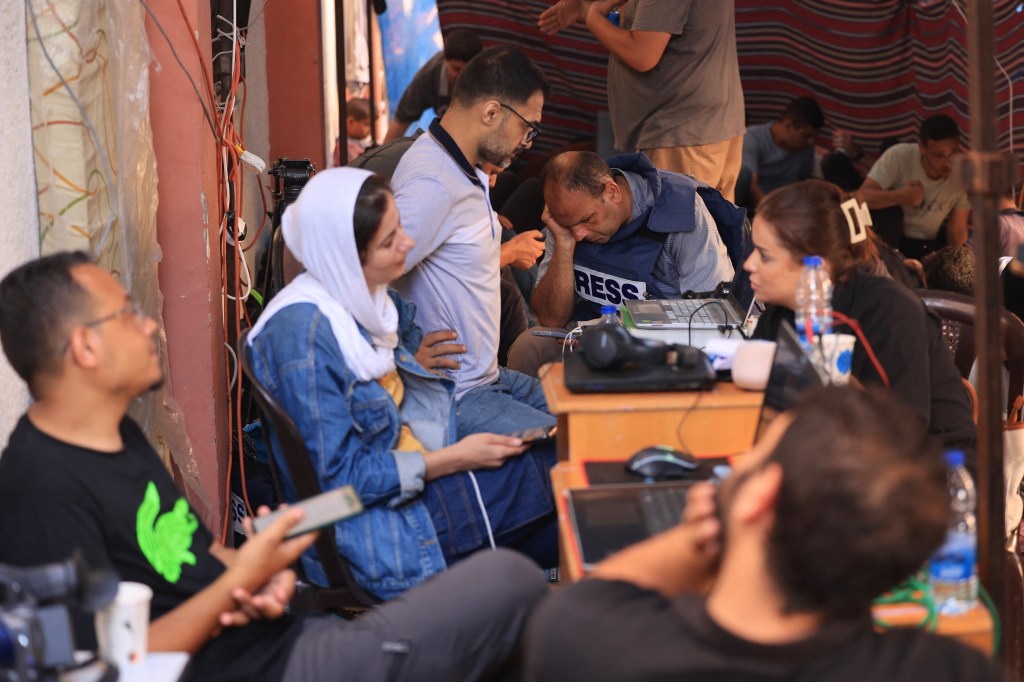As local and international media workers covering the Israel-Gaza war continue to face challenges reporting the news, the Committee to Protect Journalists (CPJ) is documenting a broad range of press freedom violations and advocating on behalf of journalists. To that end, CPJ, ARTICLE 19 and partners issued a statement in support of South Africa’s urgent request to the International Court of Justice to order Israel to facilitate unimpeded media access to Gaza.
“Despite the valiant efforts of Palestinian journalists who continue reporting despite a daily struggle to survive, Israel’s censorious actions make it nearly impossible to comprehensively, continuously and independently document what is happening on the ground in Gaza and risk significantly hampering future accountability efforts,” the signatories stated.
Separately, CPJ welcomed the International Criminal Court’s announcement on Monday that it was seeking arrest warrants for Hamas and Israeli leaders for war crimes and crimes against humanity. Noting the unprecedented number of journalists killed since October 7, 2023, CPJ CEO Jodie Ginsberg stated, “The ICC’s action is a promise for an end to the impunity that has historically plagued the killing and persecution of those who write the first draft of history.” The international humanitarian law offers protection to all journalists as civilians.
After setting an alarming precedent by shutting down Al Jazeera’s operations in Israel in early May, this week, Israeli authorities took another step towards censorship by seizing equipment from The Associated Press (AP). Israel alleged that AP had violated its new foreign broadcaster law by broadcasting a live feed of northern Gaza to Al Jazeera, one of its many clients.
Although the feed was restored the following day after international outcry, and the equipment will reportedly be returned, efforts to restrict the press are representative of Israel’s burgeoning censorship regime.
To date, at least 105 journalists and media workers — 100 of them Palestinian — have been killed since the war started, including Roshdi Sarraj, a Palestinian photojournalist and co-founder of Ain Media, who was killed on October 22 in an Israeli airstrike. In an interview with CPJ, Sarraj’s widow Shrouq Al Aila, who now heads the company, and made a call to action:
“We as journalists talked about everything. We filmed everything. It is now time for foreign correspondents to come and cover the war. …We need foreigners to come and report, maybe they have something to say, maybe someone will believe them, but we are tired and exhausted, and we have done everything in our power to tell the story.”
Global press freedom updates
- Daily Khabrain reporter Ashfaq Ahmed Sial shot dead in Punjab, Pakistan
- CPJ welcomes UK High Court decision to hear Julian Assange appeal
- Colombian journalist flees after death threat after report on extortion claims
- Nicaraguan police arrest journalist Orlando Chávez in León
- Turkish prosecutors charge journalist Sinan Aygül for threatening his attackers
- Ugandan opposition leader’s bodyguards assault, harass three journalists
- Angola journalist William Tonet’s home invaded by gunman as defamation case continues
- Syrian student journalist Atia Abu Salem on hunger strike in Jordanian prison
- Iraqi Kurdish Asayish security forces arrest journalist Shakar Star after smuggling reports
- Tunisia police arrest journalist Houssem Hajlaoui over social media posts amid crackdown
- Sudanese Armed Forces arrest journalist Siddiq Dalay
- UN asks Taiwanese journalists for Chinese passports to attend WHO assembly
Spotlight
Russian authorities must immediately halt their criminalization of journalists and independent media outlets by labeling them as “undesirable” and by issuing punitive sanctions against those they deem “foreign agents.”
On May 16, the prosecutor general’s office banned SOTA, one of Russia’s last independent news outlets, as an undesirable organization, according to news reports and Aleksei Obukhov, SOTA’s senior editor, who spoke with CPJ.
Russian authorities also issued fines against two journalists, at least one of whom lives in exile, and added a third, based in Germany, to its wanted list for violating the foreign agents law, which requires outlets and individuals that the government deems “under foreign influence” or that receive external funding to label their content as produced by a foreign agent.
Read more about how Russia utilizes its foreign agent law to criminalize journalism.
What we are reading
- Attacks against UN human rights experts must cease: Coordination Committee of Special Procedures — The Office of the High Commissioner for Human Rights
- As a war reporter, I trusted my fixer with my life. Two weeks later, he was kidnapped — Ann Neumann, The Guardian
- The world isn’t watching — Azhar Sholgami, Africa As A Country
- Seven lessons for journalism in the age of extreme heat — Greg Cochrane, Diego Arguedas Ortiz and Katherine Dunn, Reuters Institute for the Study of Journalism
